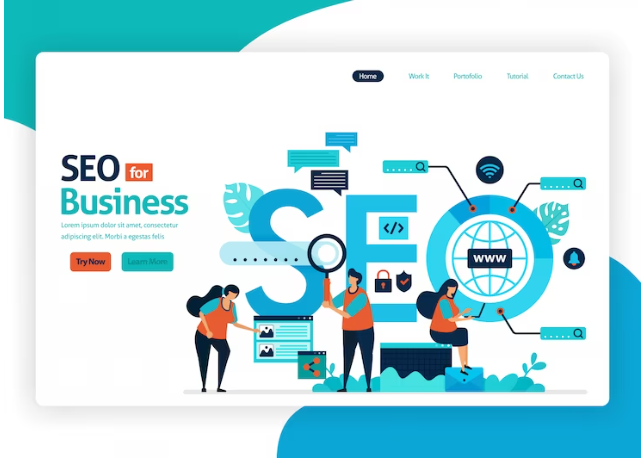Introduction:
In the fast-paced digital landscape, having a powerful Software as a Service (SaaS) solution is only half the battle. To truly thrive, your SaaS platform needs to be discoverable, relevant, and visible to your target audience. Enter the world of Search Engine Optimization (SEO) – a game-changer for nurturing organic growth and establishing a formidable online presence. In this blog, we’ll delve into the strategic steps to elevate your SaaS business through effective SaaS SEO practices.
What Is SaaS SEO?
SaaS SEO stands for Software-as-a-Service Search Engine Optimization. It’s the practice of optimizing a website specifically for a SaaS (Software-as-a-Service) business to improve its ranking on search engine results pages (SERPs). This helps attract more organic traffic, leads, and ultimately, paying customers to the SaaS product or service.
Why SEO Matters for SaaS Businesses
While paid advertising offers a quick way to reach potential customers, organic traffic generated through SEO boasts several unique advantages:
- Cost-effective: Unlike pay-per-click (PPC) ads, SEO delivers long-term benefits without requiring ongoing investment for every visitor.
- Targeted Audience: SEO allows you to attract users actively searching for solutions your SaaS provides, increasing the likelihood of conversion.
- Brand Credibility: Ranking high in search engine results pages (SERPs) enhances brand visibility and establishes you as a reliable solution provider.
- Sustainable Growth: A well-optimized website continues to attract organic traffic over time, fostering consistent growth and brand awareness.
Building a Winning SaaS SEO Strategy
Now that we understand the “why” and “who”, let’s delve into the “how” of building a winning SEO strategy for your SaaS:
- Define Your Goals and Target Audience:
- Set SMART goals: Specific, Measurable, Achievable, Relevant, and Time-bound.
- Identify your ideal customer profile (ICP): Demographics, interests, pain points, and online behavior.
- Understanding Your Audience and Keywords:
Before diving into SEO strategies, it’s crucial to understand your target audience and identify the keywords they use to search for SaaS solutions. Conduct thorough keyword research to uncover the phrases and terms potential users are entering into search engines. Use tools like Google Keyword Planner, SEMrush, or Ahrefs to build a comprehensive list of relevant keywords.
- Optimizing Your Website:
Your website is the digital storefront for your SaaS platform. Ensure it is not only user-friendly but also optimized for search engines. Key areas to focus on include:
- On-Page SEO: Optimize meta titles, descriptions, headers, and content with your target keywords.
- Site Structure: Create a clear and logical site structure, making it easy for both users and search engines to navigate.
- Mobile Responsiveness: Google prioritizes mobile-friendly websites, so ensure your SaaS platform is optimized for various devices.
- Backlink Building:
Earn high-quality backlinks to increase your SaaS platform’s authority and credibility in the eyes of search engines. Implement outreach strategies to connect with industry influencers, guest post on reputable websites, and leverage social media to share your content.
- Technical SEO for SaaS Platforms:
Don’t overlook the technical aspects of SEO. Ensure that your SaaS website is optimized for search engine crawlers:
- Site Speed Optimization: Faster loading times improve user experience and positively impact search rankings.
- SSL Encryption: Secure your website with SSL to boost trust and improve search rankings.
- Structured Data Markup: Implement structured data to provide search engines with additional context about your content.
- Link Building:
Earn backlinks from high-authority websites: This signals trust and increases your website’s authority in the eyes of search engines.
Guest blogging on relevant industry websites: Share your expertise and reach a wider audience while acquiring valuable backlinks.
Engage with online communities: Participate in forums and social media discussions, providing valuable insights and establishing yourself as a thought leader.
- Content is King:
High-quality content is the backbone of any successful SEO strategy. Develop a content marketing plan that aligns with your target audience’s needs and pain points. Consider creating:
- Blogs: Regularly publish informative and engaging blog posts related to your SaaS solution.
- Whitepapers and Case Studies: Showcase your expertise through in-depth content that demonstrates the value of your software.
- Video Content: Leverage video content to explain complex features, share user testimonials, and engage your audience.
- Track and Analyze Performance:
- Use analytics tools: Monitor website traffic, keyword rankings, and user behavior to identify areas for improvement.
- Regularly review and refine your strategy: SEO is an ongoing process, so adapt and optimize based on data-driven insights.
Conclusion:
By strategically implementing SEO practices tailored to the unique challenges and opportunities of SaaS platforms, you can unlock the full potential of organic growth. Remember, SEO is an ongoing process that requires dedication and adaptability. Stay informed about industry trends, adjust your strategies accordingly, and watch as your SaaS platform rises through the ranks, attracting the attention it deserves in the crowded digital space







